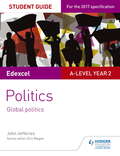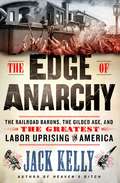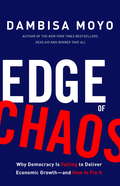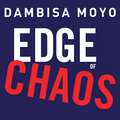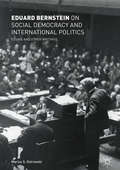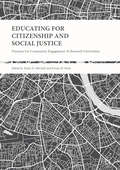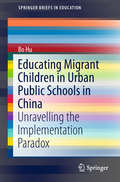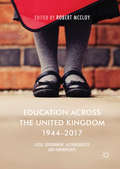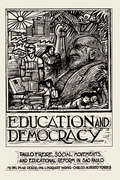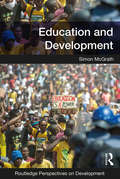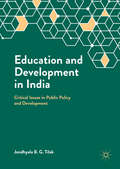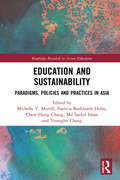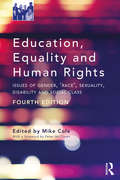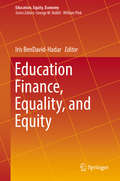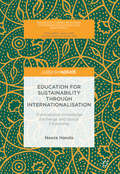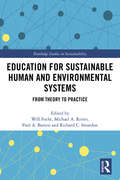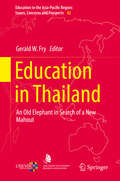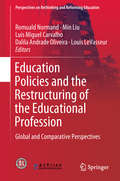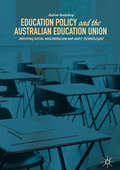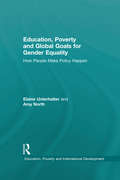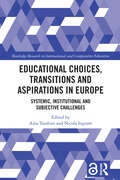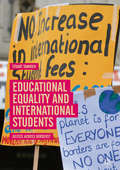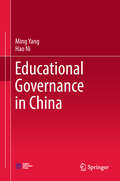- Table View
- List View
Edexcel A-level Politics Student Guide 5: Global Politics
by John JefferiesWritten by experienced teacher John Jefferies this Student Guide for Politics:-Identifies the key content you need to know with a concise summary of topics examined in the A-level specifications-Enables you to measure your understanding with exam tips and knowledge check questions, with answers at the end of the guide-Helps you to improve your exam technique with sample answers to exam-style questions-Develops your independent learning skills with content you can use for further study and research
Edexcel A-level Politics Student Guide 5: Global Politics
by John JefferiesWritten by experienced teacher John Jefferies this Student Guide for Politics:-Identifies the key content you need to know with a concise summary of topics examined in the A-level specifications-Enables you to measure your understanding with exam tips and knowledge check questions, with answers at the end of the guide-Helps you to improve your exam technique with sample answers to exam-style questions-Develops your independent learning skills with content you can use for further study and research
The Edge of Anarchy: The Railroad Barons, the Gilded Age, and the Greatest Labor Uprising in America
by Jack Kelly"Timely and urgent...The core of The Edge of Anarchy is a thrilling description of the boycott of Pullman cars and equipment by Eugene Debs’s fledgling American Railway Union..." —The New York Times"During the summer of 1894, the stubborn and irascible Pullman became a central player in what the New York Times called “the greatest battle between labor and capital [ever] inaugurated in the United States.” Jack Kelly tells the fascinating tale of that terrible struggle." —The Wall Street Journal"Pay attention, because The Edge of Anarchy not only captures the flickering Kinetoscopic spirit of one of the great Labor-Capital showdowns in American history, it helps focus today’s great debates over the power of economic concentration and the rights and futures of American workers." —Brian Alexander, author of Glass House"In gripping detail, The Edge of Anarchy reminds us of what a pivotal figure Eugene V. Debs was in the history of American labor... a tale of courage and the steadfast pursuit of principles at great personal risk." —Tom Clavin, New York Times bestselling author of Dodge CityThe dramatic story of the explosive 1894 clash of industry, labor, and government that shook the nation and marked a turning point for America.The Edge of Anarchy by Jack Kelly offers a vivid account of the greatest uprising of working people in American history. At the pinnacle of the Gilded Age, a boycott of Pullman sleeping cars by hundreds of thousands of railroad employees brought commerce to a standstill across much of the country. Famine threatened, riots broke out along the rail lines. Soon the U.S. Army was on the march and gunfire rang from the streets of major cities. This epochal tale offers fascinating portraits of two iconic characters of the age. George Pullman, who amassed a fortune by making train travel a pleasure, thought the model town that he built for his workers would erase urban squalor. Eugene Debs, founder of the nation’s first industrial union, was determined to wrench power away from the reigning plutocrats. The clash between the two men’s conflicting ideals pushed the country to what the U.S. Attorney General called “the ragged edge of anarchy.”Many of the themes of The Edge of Anarchy could be taken from today’s headlines—upheaval in America’s industrial heartland, wage stagnation, breakneck technological change, and festering conflict over race, immigration, and inequality. With the country now in a New Gilded Age, this look back at the violent conflict of an earlier era offers illuminating perspectives along with a breathtaking story of a nation on the edge.
Edge of Chaos
by Dambisa MoyoWhy our democracies need urgent reform, before it's too lateA generation after the fall of the Berlin Wall, the world is once again on the edge of chaos. Demonstrations have broken out from Belgium to Brazil led by angry citizens demanding a greater say in their political and economic future, better education, heathcare and living standards. The bottom line of this outrage is the same; people are demanding their governments do more to improve their lives faster, something which policymakers are unable to deliver under conditions of anaemic growth. Rising income inequality and a stagnant economy are threats to both the developed and the developing world, and leaders can no longer afford to ignore this gathering storm.In Edge of Chaos, Dambisa Moyo sets out the new political and economic challenges facing the world, and the specific, radical solutions needed to resolve these issues and reignite global growth. Dambisa enumerates the four headwinds of demographics, inequality, commodity scarcity and technological innovation that are driving social and economic unrest, and argues for a fundamental retooling of democratic capitalism to address current problems and deliver better outcomes in the future. In the twenty-first century, a crisis in one country can quickly become our own, and fragile economies produce a fragile international community. Edge of Chaos is a warning for advanced and emerging nations alike: we must reverse the dramatic erosion in growth, or face the consequences of a fragmented and unstable global future.
Edge of Chaos
by Dambisa MoyoWhy our democracies need urgent reform, before it's too lateA generation after the fall of the Berlin Wall, the world is once again on the edge of chaos. Demonstrations have broken out from Belgium to Brazil led by angry citizens demanding a greater say in their political and economic future, better education, heathcare and living standards. The bottom line of this outrage is the same; people are demanding their governments do more to improve their lives faster, something which policymakers are unable to deliver under conditions of anaemic growth. Rising income inequality and a stagnant economy are threats to both the developed and the developing world, and leaders can no longer afford to ignore this gathering storm.In Edge of Chaos, Dambisa Moyo sets out the new political and economic challenges facing the world, and the specific, radical solutions needed to resolve these issues and reignite global growth. Dambisa enumerates the four headwinds of demographics, inequality, commodity scarcity and technological innovation that are driving social and economic unrest, and argues for a fundamental retooling of democratic capitalism to address current problems and deliver better outcomes in the future. In the twenty-first century, a crisis in one country can quickly become our own, and fragile economies produce a fragile international community. Edge of Chaos is a warning for advanced and emerging nations alike: we must reverse the dramatic erosion in growth, or face the consequences of a fragmented and unstable global future.
Edmund Burke as Historian: War, Order And Civilisation
by Sora SatoThis book provides a comprehensive survey of Edmund Burke's historical thought, a neglected area of both Burke scholarship and historiography. Ranging from Burke's general conception of history to his accounts of English, European, American, Irish and Asian-Muslim history, this book offers much-needed depth and context to his political life. Sora Sato illuminates Burke's ideas on civilisation and world order with careful analysis of both his well-known historical concepts, such as the ancient constitution of England and the spirit of chivalry, as well as his lesser-known opinions on war and the military. Written with clarity and precision, this book is an invaluable reference for scholars of Burke, early modern European history and political philosophy.
Eduard Bernstein on Social Democracy and International Politics: Essays And Other Writings
by Marius S. OstrowskiThis book presents three later works by the German social-democratic thinker and politician Eduard Bernstein, translated into English in full for the first time: Social Democracy and International Politics: Social Democracy and the European Question; League of Nations or League of States; and International Law and International Politics: The Nature, Questions, and Future of International Law. Written at the height of WW1, they address the abrupt collapse of international socialist cooperation after its outbreak, and outline a vision for peace in Europe and beyond. Bernstein argues for an ethical, democratic approach to international relations, governed by a corpus of international law, and safeguarded by an international union dedicated to preserving peoples’ right to self-determination. He is sceptical of the state-centrism of early-20th-century liberal proposals for developing strong international institutions, while also deeply critical of militarist and imperialist political leaders and thinkers for preventing even these limited proposals from being realised. Instead, in these works, Bernstein urges social democrats to campaign for a system of international economic, legal, and cultural relations that he calls the ‘republic of peoples’, and he explores themes of patriotism, class struggle, diplomacy, and free trade that still carry resonance today.
Educating for Citizenship and Social Justice
by Tania D. Mitchell Krista M. SoriaIn this edited volume, authors explore the ways in which departments, programs, and centers at public research universities are working to better engage students in the work of citizenship and social justice. The chapters in this book illuminate the possibilities and challenges for developing community engagement experiences and provide evidence of the effects of these efforts on communities and undergraduate students' development of citizenship outcomes. This text reveals how important the integration of our intentions and actions are to create a community engaged practice aimed towards justice.
Educating Migrant Children in Urban Public Schools in China: Unravelling the Implementation Paradox (SpringerBriefs in Education)
by Bo HuThis book investigates the implementation of the education policy for migrant children, arguing that it has been selectively implemented: while some policy themes have been effectively implemented, others have not. Four factors underlie this selective implementation: specificity of policy goals, funding for education, local incentives in an exam-oriented education system, and intergroup relationships between migrant and urban children.
Education Across the United Kingdom 1944–2017: Local Government, Accountability And Partnerships
by Robert McCloyThis book provides a comprehensive understanding of how education has developed over the last 70 years within the United Kingdom. As education in Wales and Scotland continues to develop following increasing devolution, the contributors draw from personal accounts and practical experience to provide a comparison and evaluation of these differences. A critical stage in the history of education has been reached, particularly in light of the decision for Britain to leave the European Union: the authors explore the emergent fault lines and identify practical reforms. While this book will undoubtedly be of interest to educational historians, it will also be a valuable reference point for educationalists, practitioners and politicians. The contributors unpick the larger role of education in the United Kingdom and propose practical ways forward amid a time of crisis.
Education And Democracy: Paulo Freire, Social Movements, And Educational Reform In Sao Paulo
by Pilar O'CadizThis book examines critically the ideas and performance of Paulo Freire as secretary of education in Brazil in the early 1990s, during the socialist democratic administration of the Workers Party in So Paulo. With an emphasis on theory, the authors discuss the relationships between the state and social movements as well as the relationships between teachers and curriculum reform. In so doing, they thoroughly examine the intersection of politics and education in educational reform in one of the major urban centers of Latin America. This book examines critically the ideas and performance of Paulo Freire as secretary of education in Brazil in the early 1990s, during the socialist democratic administration of the Workers Party in So Paulo. With an emphasis on theory, the authors discuss the relationships between the state and social movements as well as the relationships between teachers and curriculum reform. In so doing, they thoroughly examine the intersection of politics and education in educational reform in one of the major urban centers of Latin America.A central focus of the book is the project of interdisciplinarity in teachers trainingan essential principle of the Freirean proposal. By concentrating on classrooms, schools, and teachers and by use of a detailed empirical analysis, this book constitutes an assessment of an original, far-reaching, and radical process of educational reform. The foundations and methodologies of the So Paulo experience can be implemented in different international contexts. The authors show how students and teachers were engaged in the process of curriculum and governance reform and what kind of political awareness emerged in schools and communities experiencing radical educational reform.
Education and Development: Education, Training And Development In Africa (Routledge Perspectives on Development)
by Simon McGrathThis title explores the place of education in development debates and provides a systematic as well as a theoretical overview of the main approaches to education and development. It emphasises the fact that education is profoundly shaped by national and local cultures even if many issues are shared across institutions in different locations. Education and Development discusses different theoretical accounts from different disciplinary traditions to help students understand the complexity of the overall debate. The text does not shy away from discussions of education’s negative impacts, and insists that an account of education must include consideration of early childhood development, adult, vocational and higher education, as well as the growing range of informal and distance forms. It includes chapters on human capital, human rights and human development, and on education, gender and development, and draws on examples from a wide range of countries and regions such as India, Hong Kong, Kenya and South Africa. The book has a well-developed pedagogy including text boxes, chapter summaries, key questions, links to websites and videos, and annotated further reading sections. Particular attention is paid to ensuring that a plurality of voices, contexts and educational sub-sectors are represented in the boxes, weblinks and references. Education and Development provides an introductory overview to the field, aimed at the undergraduate level, while critically engaging with key themes and questions. The book will also be of interest to development practitioners, policymakers, entrepreneurs and corporate employees engaged in aspects of education and development work.
Education and Development in India: Critical Issues In Public Policy And Development
by Jandhyala B.G. TilakDrawing on empirical, interdisciplinary research, this book presents a critical review of some of the major issues that are of interest to researchers, policymakers and planners in developing as well as advanced countries, including specifically in India. It provides an in-depth review of some of the major development policy issues in education in general, and in India in particular, over the past 2-3 decades. Besides presenting an overview of the educational developments in India that reflects issues such as growth, equity, efficiency, foreign aid, decentralization, center-state relations, financing, and cost recovery, the book puts forward in-depth analyses of education poverty, interrelations between education and poverty, low level of outcomes in elementary education, effects of structural adjustment policies and approaches on education, south-south cooperation, etc. It also critically discusses changes in policies relating to financing higher education, external assistance for education, and how the growth of private higher education is affecting society at large. The dichotomy between public policy and action is also highlighted in many chapters. On the whole, while the importance of education is being increasingly recognized, the state does not seem to be as willing to foot the bill for education as the households and even the private sector. Occasionally contrasting with international evidence on, for example, financing higher education, private higher education, or the effects of neo-liberal policies, the book offers an interesting read for a wider audience.
Education and Sustainability: Paradigms, Policies and Practices in Asia (Routledge Research in Asian Education)
by Michelle Y. Merrill Patricia Burkhardt-Holm Chew-Hung Chang Md Saidul Islam Youngho ChangThis book provides an introduction to the state of sustainability education in Asia. It covers national policies, institutional policies and practices within Asian universities, sustainability considerations for teacher training at schools of education, and pedagogical practices for sustainability in higher education. With contributors from universities and NGOs in Indonesia, Singapore, Malaysia, Thailand, the Philippines, Cambodia, India, China and South Korea, this volume brings together the best papers from a series of successful international conferences on post-secondary education for sustainability in Asia. The book is organized into five parts: • Part I focuses on paradigms for sustainability education • Part II looks at sustainability education contexts, strategies and outcomes at the national level • Part III gives examples of sustainability programs and strategies adopted at specific universities • Part IV highlights sustainability education research from schools of education • Part V explores specific examples of post-secondary educational practices in sustainability
Education, Equality and Human Rights: Issues of Gender, 'Race', Sexuality, Disability and Social Class
by Mike ColeThe fourth edition of Education, Equality and Human Rights has been fully updated to reflect the economic, political, social and cultural changes in educational and political policy and practice, as austerity continues and in the light of the EU referendum. Written by a carefully selected group of experts, each of the five equality issues of gender, ‘race’, sexuality, disability and social class are covered as areas in their own right as well as in relation to education. Key issues explored include: human rights, equality and education women and equality, historically and now gender and education perspectives throughout time racism in the UK from the Empire to the present racism and education from imperial times to the May government the making and remaking of sexualities the challenges surrounding teaching and learning about sexuality in schools the struggle for disability equality inclusive education social class, Marxism and socialism social class inequality and education. With an uncompromising and rigorous analysis of education and human rights and a foreword from Professor Peter McClaren, Education, Equality and Human Rights is an essential resource across a wide range of disciplines and for all those interested in education, social policy and human rights.
Education Finance, Equality, and Equity (Education, Equity, Economy Ser. #5)
by Iris BenDavid-HadarThis volume revisits educational equality and equity issues, especially, in education finance-related topics consisting of 15 chapters and organized in two parts. The first part of the volume entitled “Education Finance”, focuses on equity aspects of resource allocation and its influence on education. The second part, entitled “Educational Equality and Equity”, focuses on the conceptualization, and the measurements of educational inequity, and inequality with special emphasis on the cost of inequality. The field of education finance has been significantly influencing policy-makers in many countries in recent years. This volume is focused on equity and equality in education finance in an international frame. This book would be of interest to (1) scholars at the fields of education finance, economics of education, and educational policy, (2) graduate students at the course of school finance or economics of education, and (3) local and global policy makers at the fields of education policy, and education finance.
Education for Sustainability through Internationalisation: Transnational Knowledge Exchange And Global Citizenship (Palgrave Studies In Global Citizenship Education And Democracy Ser.)
by Neera HandaThis book suggests how the internationalisation of teaching and learning for sustainability can be a vehicle for a two-way flow of knowledge across national, cultural and theoretical boundaries. Establishing links between the internationalisation of education and the ideal of global sustainability, the author presents innovative alternative solutions to address the pressing social, environmental and ethical problems of our age, a global priority demanding an educational response. By engaging with the Hindi concept of tri-vid, the three-in-one unification of knowledge, the author reassesses the very nature of knowledge through the intellectual agency of both students and educators. Once opportunities for alternatives not available in dominant Western knowledge traditions are recognised, the development of an innovative alternative perspective becomes possible. This pioneering book will be of interest to students and scholars of international education, sustainability education and globalisation.
Education for Sustainable Human and Environmental Systems: From Theory to Practice (Routledge Studies in Sustainability)
by Will Focht Michael A. Reiter Paul A. Barresi Richard C. SmardonThe goal of Sustainable Human and Environmental Systems (SHES) education is to prepare students to facilitate social learning in communities that builds knowledge of, capacity for, and commitment to sustainability to facilitate the emergence of sustainable societies. The SHES approach to sustainability education relies on complexity-based systems thinking that transcends disciplinary boundaries. This book provides a comprehensive guide to the SHES approach, including its rationale and theoretical foundation, its pedagogy and practical applications in curricula, and ways to support the approach through institutional administration. This book will be of great interest to academics and students of education, environmental sciences and studies, sustainability and sustainable development, natural resource management, conservation, environmental policy, environmental planning, and related fields in higher education. Educators can use this book as a guide to SHES pedagogy, curriculum design, sustainability, environmental studies, sustainable development, and sustainable well-being. Administrators will find the book useful in establishing, evaluating, staffing, and promoting programs based on the SHES approach.
Education in Thailand: An Old Elephant In Search Of A New Mahout (Education in the Asia-Pacific Region: Issues, Concerns and Prospects #42)
by Gerald W. FryThis interdisciplinary book offers a critical analysis of Thai education and its evolution, providing diverse perspectives and theoretical frameworks. In the past five decades Thailand has seen impressive economic success and it is now a middle-income country that provides development assistance to poorer countries. However, educational and social development have lagged considerably behind itsglobally recognized economic success. This comprehensive book covers each level of education, such as higher and vocational/technical education, and such topics as internationalization, inequalities and disparities, alternative education, non-formal and informal education, multilingual education, educational policy and planning, and educational assessment. The 25 Thai and 8 international contributors to the volume include well-known academics and practitioners. Thai education involves numerous paradoxes, which are identified and explained. While Thailand has impressively expanded its educational system quantitatively with much massification, quality problems persist at all levels. As such, the final policy-oriented summary chapter suggests strategies to enable Thailand to escape “the middle income trap” and enhance the quality of its education to ensure its long-term developmental success.
Education Policies and the Restructuring of the Educational Profession: Global and Comparative Perspectives (Perspectives on Rethinking and Reforming Education)
by Romuald Normand Min Liu Luís Miguel Carvalho Dalila Andrade Oliveira Louis LeVasseurThe book analyzes worldwide changes in school organization and the teaching profession, and how the profession has been impacted by education policies that promote assessments and accountability. It also identifies some shifts in professional positions, statuses and profiles, and characterizes the impact and contextualization of professional standards that shape teaching practices and the management of schools. Further, the book provides relevant comparative and empirical data on the restructuring of the teaching profession in an era of globalization through a critical perspective on and an overview of the main research and comparative findings across countries. As such, the book is not only directed to educational researchers but will also interest professionals and policymakers, addressing a broader education and policy community concerned by the new aspects shaping the teaching profession in the 21st century.
Education Policy and the Australian Education Union: Resisting Social Neoliberalism And Auditing Technologies
by Andrew VandenbergThis book focuses on the politics of teacher resistance to the formation and implementation of neoliberal education policies in Australia. It argues that policies such as publishing examination test results online amounts to auditing teachers’ work, and assumes incompetence from teachers, which ultimately results in diverting teachers from their true professional responsibilities. The book outlines the rise of transnational networks that promote market-oriented methods of achieving social objectives, such as good education for all students, and considers a range of explanations for why this education policy was strengthened in Australia in 2010. It also reviews a range of arguments about professional unionism, and reflects on the history of the Australian Education Union and its capacity to resist social neoliberalism. The book concludes by reporting on a case-study in which principals, teachers and parents at two ordinary schools in Australia have managed to keep market forces at bay. It will appeal to students and researchers in the fields of education and sociology, particularly those interested in education policy, political ideology, unionism, and schools.
Education, Poverty and Global Goals for Gender Equality: How People Make Policy Happen (Education, Poverty and International Development)
by Elaine Unterhalter Amy NorthDrawing on case-study research that examined initiatives which engaged with global aspirations to advance gender equality in schooling in Kenya and South Africa, this book looks at how global frameworks on gender, education and poverty are interpreted in local settings and the politics of implementation. It discusses the forms of global agreements in particular contexts, and allows for an appraisal of how they have been understood by the people who implement them. By using an innovative approach to comparative cross country research, the book illuminates how ideas and actions connect and disconnect around particular meanings of poverty, education and gender in large systems and different settings. Its conclusions will allow assessments of the approach to the post-2015 agenda to be made, taking account of how policy and practice relating to global social justice are negotiated, sometimes negated, the forms in which they are affirmed and the actions that might help enhance them. This book will be valuable for students, researchers, academics, senior teachers, senior government and inter-government officials and senior staff in NGOs working in the field of education and international development, gender, poverty reduction, and social development.
Educational Choices, Transitions and Aspirations in Europe: Systemic, Institutional and Subjective Challenges (Routledge Research in International and Comparative Education)
by Nicola Ingram Aina TarabiniEducational Choices, Transitions and Aspirations in Europe analyses educational choices and transitions in eight different European countries/regions and provides an engaging means of considering issues of inequality through international comparisons. The book is underpinned by explorations of theoretical perspectives and methodological approaches, which share the common goal of highlighting and challenging educational inequalities in relation to political imaginings and discursive constructions of notions of aspirations and choice. Beginning with an overview of the theoretical landscape, the book posits ways of understanding transitional experiences through both a social and a political lens. Comprising of chapters that explore these issues within the context of specific countries and at different stages of young people’s transitions, the collection examines the features of different European education systems and how they frame transitions and choices, before providing an overall analysis of systemic, institutional and subjective constraints on these processes. The book uniquely opens and develops an intellectual conversation about different education systems with similar educational challenges and outcomes. Assimilating key issues and solutions, this volume also makes general recommendations for policy and practice that would help to promote greater equity and social justice. The book covers a range of transition points and countries, which should make it essential reading for academics, researchers and postgraduate students with an interest in international perspectives on education. It will be particularly useful for those working in education, sociology, social policy, geography, and politics.
Educational Equality and International Students: Justice Across Borders?
by Stuart TannockIn an increasingly globalised educational landscape, this book examines whether the principle of educational equality can be applied across nation state borders. Exploring the tension between the theory of educational equality and the reality that most educational institutions are rooted in local communities and national frameworks, the author thus probes the consequences for institutions, individuals and communities as the number of international students grows exponentially. A topic that has previously received limited attention, the author draws upon theoretical literature and an empirical study of how universities in the United Kingdom conceptualise and promote principles of educational equality for international as compared with home students. This pioneering work will be interest and value to students and scholars of international education, international students, educational equality and globalisation, as well as practitioners and policy makers.
Educational Governance in China
by Hao Ni Ming YangThis book presents a comprehensive and cutting-edge overview of the educational governance reform trajectory and the latest issues in China, addressing several important topics such as administration, internal management, provision, enrollment, employment, financing, examinations, evaluation and quality assurance. In addition, this important and timely book discusses the educational system at all levels, from primary and secondary schools to colleges and universities, and each chapter ends with a discussion of the status quo, problems facing China and coping strategies for further reform. The past 68 years (1949-2016) have seen a sea change in social, economic, cultural, political and educational fields. Systematically describing the educational landscape in China, the book also reveals how the massive changes in China have shaped education, and how education has responded to the new demands placed on it.Offering essential insights into educational reform in China, the book represents a valuable resource, especially for researchers and graduate students in the field of education.
